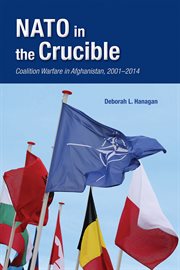Nonfiction
eBook
Details
PUBLISHED
Made available through hoopla
DESCRIPTION
1 online resource
ISBN/ISSN
LANGUAGE
NOTES
When the North Atlantic Treaty Organization (NATO) became involved in security operations during the War in Afghanistan, it faced a range of complex challenges, including a highly motivated Afghan insurgency that changed over time and repeatedly defied assumptions. Conflicts within NATO also posed challenges. The alliance brought together a quarter of the world's nations, each with its own goals and interests, in an effort to stabilize an agrarian country that posed no immediate security threat. For more than a decade, through changes in leadership and strategy, the nations experienced bitter disagreements, resentments, and a conflict that escalated to a level of violence and uncertainty few had anticipated. In NATO in the Crucible, Deborah Lynn Hanagan analyzes these challenges and explains how the alliance maintained cohesion despite them. She examines why NATO succeeded in Afghanistan when history suggests most coalitions fracture under such intense pressure. In the end, she argues, member nations summoned the political will and organizational capacity to cooperate and endure. And they agreed, above all, that failure in Afghanistan would be catastrophic-both for NATO and for the world
Mode of access: World Wide Web







